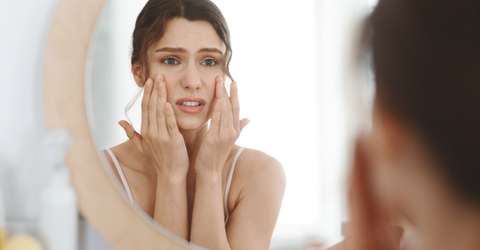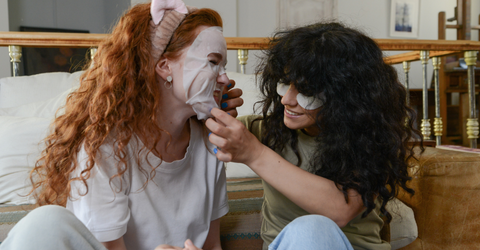In the tumultuous whirlwind of modern life, stress often takes centre stage, leaving our skin caught in its chaotic wake. Hours before a big event—a wedding, a reunion, a hot date, or a big presentation at work—a stubborn blemish (or two, or three pimples) appears, giving you yet another reason to feel stressed.
But did you know that stress-induced acne is common? Many adults, at one point or another, have dealt with acne and, in many cases, acne breakouts are a symptom of underlying conditions like stress and hormonal imbalance.
Stress acne is just as popular as other types of acne. Understanding stress acne and its nuances is pivotal in reclaiming skin clarity and confidence.
What is Stress Acne?
Have you ever wondered why your skin tends to break out more when you’re stressed? It's all about the body's response to stress. When our body is stressed, stress hormones rise, triggering oil glands to produce more oil, which in turn, triggers acne.
Stress acne, unlike hormonal acne, occurs during periods of stress, while the latter causes breakouts during period or menstrual cycles.
Tracking your acne triggers is the best way to differentiate between both types of acne and understand your breakout patterns. So note the timeline of your breakouts. Is it a stress-induced eruption or a cyclic hormonal response?
If you find that you are breaking out in the same place around the same time of the month, your acne is likely caused by hormonal imbalance, especially if it takes on the form of painful cysts.
Tracking your acne triggers is the best way to differentiate between both types of acne. So note the timeline of your breakouts. Are you breaking out after a period of stress or during your monthly cycle?
If you find that you are breaking out in the same place around the same time of the month, your acne is likely caused by hormonal imbalance, especially if it takes on the form of painful cysts.
On the other hand, stress acne typically appears in the oiliest parts of the face. Typically, these stress pimples and acne lesions appear on the face’s T-zone, the forehead, nose, and chin, and are usually accompanied by dilated pores, shininess, blackheads, whiteheads, and uneven or grainy skin. Stress acne could also be accompanied by telltale signs like redness and itchiness.
Signs of Too Much Stress
Stress can cause many types of physical and emotional symptoms. Sometimes, you may not realise these symptoms are caused by stress. Here are some signs that stress may be affecting you:
- Forgetfulness can become more prevalent during periods of heightened stress.
- Stress hormones can affect your cognitive function, leading to difficulty in recalling information or concentrating on tasks.
- Frequent aches and pains such as muscle tension or headaches, can accompany periods of stress. The body's response to stress can trigger physical discomfort, ranging from mild discomfort to more severe pain.
- Lack of energy or focus may signal that stress is affecting you mentally and physically. Stress can drain your energy reserves and make it challenging to
- concentrate on tasks or maintain productivity.
- Struggling with a stiff jaw or neck can be a physical manifestation of stress.
- Stress-induced muscle tension can lead to discomfort or pain in the jaw and neck area, affecting your comfort and mobility.
- Experiencing trouble sleeping or oversleeping can be a common response to stress. Stress hormones can interfere with your sleep cycle, leading to difficulties falling asleep, staying asleep, or waking up feeling refreshed.
- Dealing with an upset stomach, such as nausea or indigestion, can be a physical symptom of stress. Stress can affect digestion and gastrointestinal function, resulting in discomfort or digestive disturbances.
Why is Stress Related to Acne?
Many of us have experienced a breakout when we’re stressed out. So, how does one combat stress-induced breakouts? Why do pimples develop when we’re under pressure? Why does stress cause acne? The answer is simple: stress hormones, like cortisol. It increases oil production and overall inflammation, which causes acne flare-ups. With that in mind, it’s vital to improve your overall mental well-being so you can prevent stress acne.
Where do You Get Stress Acne?
Breakouts show up on our faces in different places for different reasons. For example, women experiencing hormonal issues are likely to have acne on their jawline. However, stress-related acne typically pops up on your forehead, nose, and chin — just like when we were a teenager — because these are the oiliest parts of your face. Stress pimples can be a combination of blackheads, whiteheads, red bumps, and pus-filled pimples. One way to tell if you have acne that’s stress induced is if a batch of pimples appears all at once, whereas hormonal acne typically appears gradually.
How to Stop Stress Acne?
So, how does one reduce stress acne and prevent it in the first place? The most straightforward answer is stress management by controlling our stress levels and adjusting our lifestyle the best we can. Here are some places to start toward clearer, stress-free skin. Keep reading, the best tips are at the end…
Get Enough Sleep - Getting the right amount of sleep is vital if you want to reduce stress-related breakouts. Sleep deprivation has been known to contribute to hormonal imbalances that trigger oil production and lead to breakouts. Melatonin is a hormone produced naturally while you sleep and is also associated with stimulating your immune system and protecting against bacterial infections, which helps fight acne.
Need a little assistance powering down or staying asleep? Evening rituals, like a warm bath, herbal tea, or relaxation before bedtime, encourage a good night’s rest. Once you are in bed, make sure you’re sleeping on clean sheets and pillowcases (this is one of the places where dead skin cells, bacteria, and oil can collect and then re-clog your pores).
Eat a Healthy, Balanced Diet - A clear skin diet should exclude foods high on the glycemic index — things like white pasta, rice, bread, and sweets — because they spike sugar, which can also increase oil-producing hormones. The best diet for healthy skin includes foods rich in omega-3 fatty acids, which studies have shown reduce inflammation and help with mood regulation (among other benefits). So make sure to add omega-3-rich foods like salmon, avocado, flaxseed oil, and walnuts to your grocery list.
Practice mindfulness - Stress triggers acne-causing hormones and establishing a consistent and gentle skincare routine, including regular, gentle cleansing, will effectively diminish the risk of acne flare-ups.
- Take time to enjoy each meal, avoiding the tendency to rush through them, especially while at work or engrossed in other activities.
- Spending time in nature can provide a soothing environment for reflection and relaxation. Whether it's a walk in the park or a hike in the mountains, connecting with the outdoors can calm the mind and alleviate stress.
- Meditation offers a powerful tool for cultivating mindfulness and inner peace. Dedicate a few minutes each day to meditation practice to quiet the mind and foster a sense of tranquillity. Even under the shower or brushing your teeth.
- Practice breathing exercises to centre yourself and alleviate stress. Deep breathing techniques can promote relaxation and restore a sense of balance amidst hectic daily life.
- Engaging in regular exercise or physical activity can release endorphins, the body's natural stress relievers. Whether it's a brisk walk, yoga session, or dance class, movement can elevate mood and reduce stress levels.
- Embrace a new hobby or activity that brings you joy and fulfilment. Whether it's painting, gardening, or playing a musical instrument, immersing yourself in a hobby can provide a welcome distraction from stressors.
- Exploring new culinary experiences by cooking a new recipe can be both enjoyable and therapeutic. Cooking allows for creativity and mindfulness, as you focus on the ingredients and cooking process.
- Focus on completing one task at a time rather than attempting to multitask. By concentrating your attention on one activity, you can enhance productivity and reduce feelings of overwhelm and stress.
Empowering Your Skin Journey
As you navigate stress-induced breakouts, remember: skincare is tailored to your unique needs.
If you’re experiencing stress acne, tweak your skincare routine a bit — especially if you’re not used to getting breakouts. For example, swap your cleanser out for a formula with an acne-fighting ingredient like salicylic acid. Use a spot treatment that incorporates bacteria busting benzoyl peroxide. Embrace targeted treatments, but never compromise on hydration or holistic well-being. The trick is to use a lighter formula that keeps your skin balanced, not greasy. Stripping the skin of its natural oils will only cause it to produce even more sebum, which can exacerbate breakouts.
Remember to control your stress levels, and enjoy a radiant, stress-free skin.
Join us as we champion stress-free, luminous skin—one mindful step at a time.





Comments (0)
There are no comments for this article. Be the first one to leave a message!